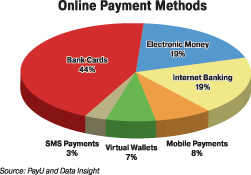A quarter of Internet users in Russia pay for services online, and 30 percent of them are from the Moscow region, according to an e-commerce market research sponsored by PayU Group.
A study, conducted in collaboration with Data Insight agency, showed that to date in 2013, 50 percent of online payments were done with a credit card, with an average amount of 2,800 rubles ($89). 58 percent of such payments came from cities with over 300 thousand residents.
The research showed that people under 35 were responsible for 61 percent of transactions, 56 percent men and 44 percent women.
"Every year, the number of Russians preferring online non-cash payments is growing with a faster rate," Pyotr Kozyakov, a sales director from PayU said. "With the introduction of high-speed [Internet] and quality [Internet] links in the regions, one can expect another boom in online payments," he added.

Every month, seven million Internet users in Russia made an average of 3.8 payments, research showed.
Nearly half paid with a credit card (44 percent), while the rest used electronic money (19 percent), online banking (19 percent), mobile phone payments (8 percent), credit cards attached to virtual wallets (7 percent) and SMS (3 percent).
Despite the high rate of credit card use, Central Bank statistics show that people are still afraid to use plastic cards, Asya Melkumova, a spokeswoman from Yandex.Money, said Wednesday.
According to the Jan. 2013 data, cash withdrawals accounted for 83 percent of all banking transactions. The remaining 17 percent were payments made with a card.
The popularity of online credit card payments will grow — it is still low as compared to developed countries, said Maria Goryacheva, a spokeswoman from PayOnline, a company providing payment processing services to online merchants.
The number of fraudulent transactions will also increase, Goryacheva added, but if merchants opt for certified payment gateways and customers open separate cards just for the Internet, the possibility of fraud will be minimized.
Experts advise people against using their "main" credit cards for Internet purchases. Yulia Mansurova, a spokeswoman from Qiwi payment service, said virtual wallets or credit cards linked to these wallets were the safest way to shop online. They allow users to limit funds on card and reduce the risk of being duped.
For those who are concerned with privacy as well as security, virtual wallets are the safest way to pay online, Melkumova said. They leave no trace and cannot be copied.
Contact the author at g.moukine@imedia.ru
A Message from The Moscow Times:
Dear readers,
We are facing unprecedented challenges. Russia's Prosecutor General's Office has designated The Moscow Times as an "undesirable" organization, criminalizing our work and putting our staff at risk of prosecution. This follows our earlier unjust labeling as a "foreign agent."
These actions are direct attempts to silence independent journalism in Russia. The authorities claim our work "discredits the decisions of the Russian leadership." We see things differently: we strive to provide accurate, unbiased reporting on Russia.
We, the journalists of The Moscow Times, refuse to be silenced. But to continue our work, we need your help.
Your support, no matter how small, makes a world of difference. If you can, please support us monthly starting from just $2. It's quick to set up, and every contribution makes a significant impact.
By supporting The Moscow Times, you're defending open, independent journalism in the face of repression. Thank you for standing with us.
Remind me later.





